Share
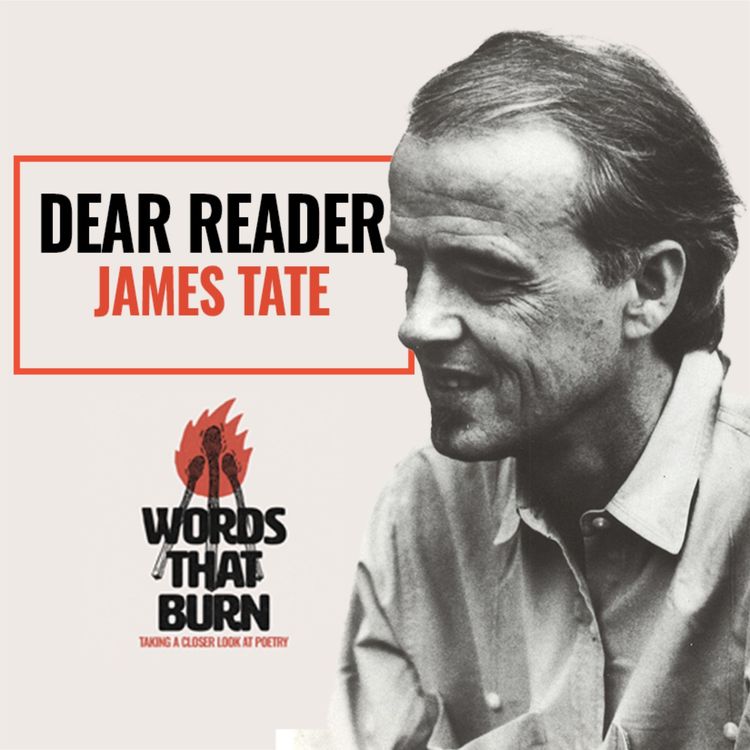
Words That Burn
Dear Reader by James Tate
In this episode of "Words That Burn," I delve into the enthralling microcosm of James Tate's poem "Dear Reader."
Our journey through "Dear Reader's" 13 lines reveals the intricate layers and emotional depth that Tate, a beloved poet of the surreal, weaves into his direct dialogue with the reader. His poem is sometimes playful in tone, other times pure tongue in cheek, but always draws the reader deeper and deeper into the lines.
I will look at Tate's distinct blend of suspenseful and macabre imagery. His ability to juxtapose the difficulties and joys of the everyday is a highlight of this episode, demonstrating why Tate's work is so popular among poets and poetry enthusiasts alike.
I dissect each segment of "Dear Reader" in this insightful episode, beginning with its enigmatic opening lines. We delve into Tate's poem's symbolism and thematic content, discussing its implications for the nature of poetry and its impact on both readers and writers. Which can be devastating and illuminating in equal measure
Learn more about James Tate's distinct style and his impact on the poetry community. Tate's experimental approach and distinct way of avoiding confessional poetry have established him as a significant figure in modern literary studies. and explain why he's considered the godfather of American surrealist poetry.
The Music In This Week's Episode:
'Phase Shift' by Scott Buckley - released under CC-BY 4.0. www.scottbuckley.com.au
Follow the Podcast:
Follow the Podcast On Instagram
More episodes
View all episodes
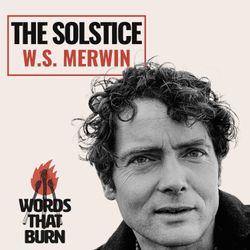
8. The Solstice by W.S. Merwin
23:39||Season 5, Ep. 8In the final episode of Words That Burn for 2025, we turn our attention to the Winter Solstice, the shortest day of the year, and the American poet who captured its delicate balance of darkness and light: W.S. Merwin.This episode's poem "The Solstice," a work of minimalist verse that explores the intersection of nature, personal vulnerability, and the cyclical nature of time. This episode traces Merwin’s evolution from a rigid formalist to an experimental voice for environmental activism. It looks at how the poet was heavily influenced by the Vietnam War and the ecological fragility of his adopted home in Hawaii.As we close out a difficult year marked by global conflict and uncertainty, this episode asks: How do we find hope when the days seem at their darkest? Merwin’s work reminds us that even when the sun goes away, it always comes back.Topics Explored:W.S. Merwin’s Evolution: From the classical influence of W.H. Auden to the stark, grounded style of The Lice.Ecopoetry & Activism: How the Vietnam War and the destruction of Hawaiian flora (like the ʻōhiʻas and honeycreepers) radicalised Merwin’s work.Poetic Analysis: Deconstructing the structure of "The Solstice" and how its shrinking stanzas mimic the dwindling daylight of December 21st.Follow the Podcast:Read the Script on SubstackFollow the Podcast On InstagramFollow the Podcast on X/TwitterFollow the Podcast on TiktokFollow the podcast on BlueskyThe Music In This Week's Episode:'Penumbra' by Scott Buckley - released under CC-BY 4.0. www.scottbuckley.com.au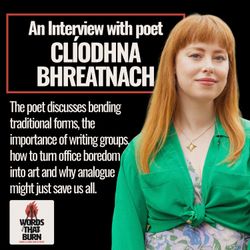
An Interview with Irish Poet Clíodhna Bhreatnach
42:25|In this episode of Words That Burn, I'm joined by Irish poet Clíodhna Bhreatnach to discuss her debut pamphlet, Pink Roses and Green. Together, we chat about a collection that sits at the intersection of the "nine-to-five grind," Millennial burnout, and a deep, tactile longing for the natural world.Clíodhna breaks down her unique approach to the "Millennial Lyric"; moving away from the pastoral and into the office kitchenette. We discuss how she navigates the Post-Celtic Tiger landscape, using poetry to document the deformation of human time under late-stage capitalism.We cover other topics like:The Romantic Office: Applying the philosophy of Keats and Wordsworth to photocopiers and Excel spreadsheets.Digital Intimacy: Finding beauty in the "randomised screensavers" of Windows desktops.The "Sick Addiction to Soft Things": Why tactile textures (paper, nature) are vital in a digital world.Writers Groups: The importance of community (specifically the Frustrated Writers Group) in banishing impostor syndrome.References & Recommendations:Bandit Country by James Conor PattersonUnstoppable Utopia by Cassandra MossThe Perfect Season by Sean PearsonThe Lover's Discourse by Anahid Nersessian (Criticism on Keats)About the poet: Clíodhna Bhreatnach is from Waterford and lives in Dublin. Her poems have appeared in Poetry Ireland Review, The Stinging Fly, and The Forward Book of Poetry 2023. She has recently been awarded a Dublin City Council Arts Bursary for 2025. She is the former poetry editor of Frustrated Writers Group.Find the book and the poet:https://cliodhnabhreatnach.comhttps://greenbottlepress.com/product/pink-roses-green-by-cliodhna-bhreatnach/Follow the Podcast:Read the Interview on SubstackFollow the Podcast On InstagramFollow the Podcast on X/TwitterFollow the Podcast on TiktokFollow the podcast on Bluesky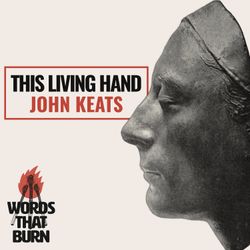
7. This Living Hand by John Keats
15:26||Season 5, Ep. 7For Halloween 2025, Words That Burn resurrects one of the most chilling poems in English literature: "This Living Hand" by John Keats. This short, macabre poem wasn't published until 77 years after Keats's death, making it feel like a genuine message from beyond the grave.In this special episode, we explore the poem's dark, gothic imagery and the terrifying "strange bargain" it offers the reader. We dissect its uncanny duality, its sense of dread, and the horrifying biographical context of Keats's final days; a "posthumous existence" of body horror that forged this masterpiece.I look at the poem's vampiric mechanism and Keats's desperate plea, not only for a transfusion of life, but for the artistic immortality he feared he'd never achieve.This episode covers:The dark history of Keats's "This Living Hand."How Keats's embrace of darkness ("the burden of mystery") set him apart from other Romantic poets.A close reading of the poem's body horror, from "earnest grasping" to the "icy silence of the tomb."The link between Keats's final, agonising days and the poem's "vampiric" plea for life.Why this poem is a perfect, terrifying read for the Halloween season.Follow the Podcast:Read the Script on SubstackFollow the Podcast On InstagramFollow the Podcast on X/TwitterFollow the Podcast on TiktokFollow the podcast on BlueskyThe Music In This Week's Episode:'Soul Searcher' by Scott Buckley - released under CC-BY 4.0. www.scottbuckley.com.au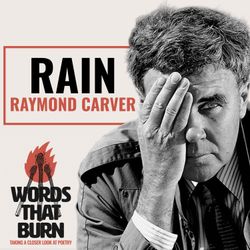
6. Rain by Raymond Carver
20:42||Season 5, Ep. 6Ever woken up to rain and felt the urge to stay in bed all day? On this episode of Words That Burn "Rain" by Raymond Carver. This is a poem that seems ideally suited to September, exploring that universal feeling of surrendering to the weather and the comfort of your own bed.Over the course of the episode I'll explore how Carver, a titan of the American short story, applies his signature "dirty realism" and sparse prose to his first love: poetry. We'll break down "Rain" stanza by stanza, examining the masterful techniques like enjambment and a staccato rhythm that turn a simple scene into a profound meditation on life.To truly understand this poem, you have to understand the man. I look back into Raymond Carver's difficult life; his blue-collar struggles, his battle with alcoholism, and the cancer diagnosis that shaped his final years. Discover how his personal tragedies fuel the poem's stunning final lines about "unforgivable mistakes" and the resolute desire to live it all again.In this episode, you will learn about:Raymond Carver's poetic style: How his minimalist approach in short stories translates to his poetry.Literary Analysis of "Rain": A line-by-line breakdown of imagery, structure, and rhythm.The Power of Immediacy: How Carver uses techniques like pronoun omission to pull you directly into the experience.Roland Barthes' "Punctum": We apply this photographic theory to understand how Carver creates moments of startling emotional impact that "puncture" the ordinary.The Link Between Carver's Life and Art: How understanding his biography is essential to interpreting his work on regret, mortality, and acceptance.00:00 Poetry Reading00:36 Introduction to Words That Burn01:47 Exploring Raymond Carver's Poetry02:59 Carver's Writing Style and Techniques03:46 The Struggles and Inspirations of Raymond Carver05:08 Analysing 'Rain' by Raymond Carver15:32 The Impact of Carver's Life on His Poetry19:25 Final Thoughts Follow the Podcast:Read the Script on SubstackFollow the Podcast On InstagramFollow the Podcast on X/TwitterFollow the Podcast on TiktokFollow the podcast on BlueskyThe Music In This Week's Episode:'Incredulity' by Scott Buckley - released under CC-BY 4.0. www.scottbuckley.com.au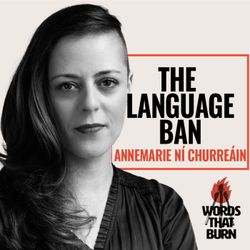
5. The Language Ban by Annemarie Ní Churreáin
21:08||Season 5, Ep. 5This week on Words That Burn, we delve into the powerful and moving poem "The Language Ban" from Annemarie Ní Churreáin's acclaimed 2021 collection, The Poison Glen. Join me as we explore the hidden history of Irish Sign Language (ISL) and the devastating impact of its suppression.Discover the story of St. Joseph's School for Deaf Boys in Cabra, Dublin, and how the controversial 1880 Milan Conference led to a policy of "Oralism," forcing a spoken language upon deaf children and branding their native sign language as shameful. I'll unpack Ní Churreáin's potent imagery, from the "state makers" who "banished" the signs to the demonisation of the hand itself within a deeply religious and colonial context.This episode explores:The dark history behind The Poison Glen and its connection to Irish folklore and the suppression of a nation's past.The crucial difference between Irish Sign Language (ISL) and other sign languages, and how it evolved uniquely within Irish culture.The devastating impact of the Milan Conference and the enforcement of Oralism on the Irish deaf community.The parallels between the suppression of ISL and the historical attempts to eradicate the Irish language (Gaeilge), including the use of the "tally stick."A deep-dive analysis of Annemarie Ní Churreáin's "The Language Ban," examining its structure, folkloric references (the hawthorn and the Salmon of Knowledge), and its powerful conclusion on the "forced grammar" imposed on a community.Join the conversation as we discuss how poetry can unearth forgotten histories and give voice to the silenced. This is essential listening for anyone interested in Irish history, poetry, disability studies, and the enduring power of language.Follow the Podcast:Read the Script on SubstackFollow the Podcast On InstagramFollow the Podcast on X/TwitterFollow the Podcast on TiktokFollow the podcast on BlueskyThe Music In This Week's Episode:'Incredulity' by Scott Buckley - released under CC-BY 4.0. www.scottbuckley.com.au
Door On The Road by Mosab Abu Toha
28:50|Donation Link: Ireland Palestine Solidarity Campaign: http://www.ipsc.ie/support/donateIn this episode of Words That Burn, I take a closer look at "Door on the Road," by Palestinian poet Mosab Abu Toha. The poem opens with the aftermath of an explosion in a refugee camp, where a fallen door becomes a grave marker for a young man whose only remaining connection to his past is a worn key — the key to his family’s lost home in Yaffa.As I unpack the powerful imagery in Abu Toha’s work, I explore how everyday objects like doors and keys become symbolic vessels for profound loss, memory, and hope in the context of forced displacement. I also delve into the historical significance of Yaffa, a once-thriving Palestinian city now largely inaccessible to its original inhabitants, and how the city’s erasure is mirrored in the poem’s narrative.Throughout the episode, I draw connections between the poem and Abu Toha’s 2024 poetry collection Forest of Noise, a body of work that documents life in Gaza through stark, evocative imagery and deeply personal narratives. I discuss how the collection uses poetry as a means of bearing witness to everyday atrocities and preserving cultural memory amidst conflict.00:00 The Poem01:14 Introduction to Words That Burn Podcast01:26 Support for Palestine02:52 Mosab Abu Toha: A Witness Poet06:27 Analyzing 'Door on the Road'08:02 The Symbolism of the Door14:02 The Key to Yaffa22:10 The Tragic Reality of Palestinian Life27:11 Final Thoughts and Call to ActionFollow Mosab Abu TohaFollow the Podcast:Read the Script on SubstackFollow the Podcast On InstagramFollow the Podcast on X/TwitterFollow the Podcast on TiktokFollow the podcast on BlueskyThe Music In This Week's Episode:'Echoes' by Scott Buckley - released under CC-BY 4.0. www.scottbuckley.com.au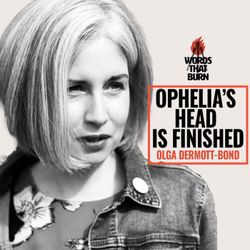
3. Ophelia's Head Is Finished by Olga Dermott-Bond
30:17||Season 5, Ep. 3In this episode of Words That Burn, I take a closer look at Ophelia’s Head Is Finished by the brilliant poet Olga Dermott-Bond—a haunting and layered ekphrastic response to John Everett Millais’ iconic painting Ophelia. Inspired by a chilling epigraph from one of Millais’ 1852 letters, the poem invites us to reconsider what lies beneath the surface of this romanticised artwork, and to centre the overlooked woman at its heart: Elizabeth Siddal.As I explore the poem stanza by stanza, I reflect on its gothic tone, its critique of the Pre-Raphaelite obsession with beauty, and the physical toll of artistic creation on real women. The lines between Siddal and Shakespeare’s Ophelia, between art history and lived experience, begin to blur—and what emerges is a powerful meditation on agency, endurance, and the quiet violence of expectation.Throughout the episode, I talk about the tradition of ekphrasis—poetry inspired by visual art—and how Dermott-Bond uses it not just to interpret but to reclaim. If you’re curious about the intersections between poetry, painting, feminism, and forgotten voices, I think you’ll get a lot out of this one.00:00 The Poem01:26 Welcome to Words That Burn01:41 Context and Epigraph Analysis02:34 Exploring the Poem's Themes03:06 Historical Context of Ophelia12:20 The Pre-Raphaelite Movement13:49 Elizabeth Siddal's Story15:01 Analysing the Poem's Stanzas25:33 The Final Stanza and ConclusionResources & Links: Millais' OpheliaThe Story Behind Ophelia by Kelly Richman-AbdouAlluviaFollow the Podcast:Read the Script on SubstackFollow the Podcast On InstagramFollow the Podcast on X/TwitterFollow the Podcast on TiktokFollow the podcast on BlueskyThe Music In This Week's Episode:‘Meanwhile’ by Scott Buckley – released under CC-BY 4.0. www.scottbuckley.com.au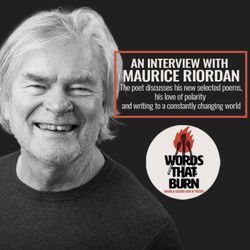
An Interview with Maurice Riordan
39:33||Season 5In this episode of Words That Burn, poet Maurice Riordan joins Ben to reflect on a career-spanning selection of poems curated by former student and fellow poet Jack Underwood. With the new Selected Poems from Faber and Faber arranged out of chronology, Riordan discusses how themes like rural life, modernity, nature, and time emerge more clearly—and more hauntingly—across decades of work.Together, they explore how poetry manipulates time, the influence of film and science, the uncanny weight of Irish myth, and what it means to write with one foot in the past and the other in an overcrowded present. From candlelit farmhouses to televised World Cups, Riordan’s work straddles eras, places, and emotional states—always grounded in vivid, startling imagery.Poems discussed include Rural Electrification, 1956, The Flight, The Lull, Timeout, Gone With the Wind, and Badb, among others.00:00 Introduction to the Podcast00:06 Maurice Riordan's Selected Poems00:48 Themes and Evolution in Maurice's Work03:15 Rural Electrification and Early Influences06:35 The Power of Imagery in Poetry12:28 Cinematic Influences on Poetry17:21 Observations and Domestic Themes21:23 Exploring Connection with Nature25:50 The Influence of Irish Mythology30:24 Reflections on Isolation and Alienation33:01 Balancing Life Between London and Cork34:42 The Intersection of Poetry and Science37:26 Conclusion and Final ThoughtsFollow the Podcast:Read the Script on SubstackFollow the Podcast On InstagramFollow the Podcast on X/TwitterFollow the Podcast on TiktokFollow the podcast on Bluesky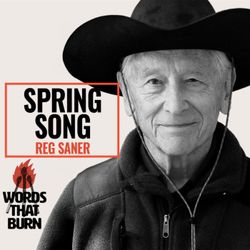
2. Spring Song by Reg Saner
13:17||Season 5, Ep. 2Spring Song by Reg Saner: an eternal cycle we're all lucky to haveIn this episode of 'Words That Burn,' Reg Saner's poem 'Spring Song.' is the central focus With spring setting in, the episode explores the poetic beauty and profound themes in Saner's work, such as points of intersection and transition, cyclical nature, and the ineffable qualities of the natural world. It also uncovers some fascinating aspects of Saner's life, including the roots of his obsession with conservation, his varied career as a soldier, professor, conservationist, and poet, and his eventual shift from poetry to essays. Join me as I take a look at a true hidden gem of American poetry, a man who eventually left the art form behind, but also left an indelible and distinct imprint on it too.00:00 Introduction to Spring Song00:37 Welcome to Words That Burn01:45 Exploring Reg Saner's Background04:09 Analysing the Poem's Imagery06:31 The Cyclical Nature of Seasons09:22 Orpheus and the Paradox of Change10:27 Final Thoughts and Reflections11:51 Contact InformationFollow the Podcast:Read the Script on SubstackFollow the Podcast On InstagramFollow the Podcast on X/TwitterFollow the Podcast on TiktokFollow the podcast on BlueskyThe Music In This Week's Episode:'Petrichor' by Scott Buckley - released under CC-BY 4.0. www.scottbuckley.com.au